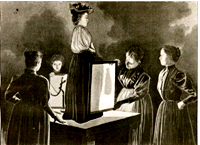 |

OIL WELLS AT SEA--"An oil well 10 miles out in the Gulf of Mexico--the first operation of this nature so far from land--is only a forerunner of others even greater distances off shore, states R. G. Watts of the Magnolia Petroleum Company. The platform is at an elevation of 20 feet above mean high water to give protection against waves of maximum expected height. Water at the site was 16 feet deep at mean low tide."
MICROFILMS AT WAR--"The miraculous revivals of several American fighting ships during the war were due to one of our most unusual weapons: microfilmed plans of every floating unit, stored in the Naval Archives Building in Washington, D.C., and, later, at Pearl Harbor. When a vessel was severely damaged, the facts were radioed to headquarters, and by the time the stricken ship limped into port, the new parts had already been pre-fabricated from plans flown to repair stations."
KLONDIKE GOLD RUSH--"The announcement of the return of two steamers from the Alaskan gold fields along the Klondike River last month, with a small party of miners on board who carried about a million and a half dollars in gold between them, has gone through the world like an electric shock. The news is expected to set off a 'gold fever' comparable only to the wild excitement of the California discoveries in 1849. Already the 'rush' has begun, in spite of the warnings of the miners who have just come out of the country, and the detailed account by the press of the inhospitable and inaccessible nature of the placer districts."
WHAT'S FOR DINNER?--"An inhabitant of the Scilly Islands was struck by the fact that the rats there seemed to prosper greatly, although the place is very barren. He resolved to investigate the cause of this, and digging up some of the nests by the seashore, found that the rats had dragged crabs into their holes, and, in order to prevent their escape, had bitten off their legs. No doubt the prey had been seized at low tide and brought home."
BLOOD WORK--"Dr. Judson Deland, of Philadelphia, has invented an instrument for counting blood corpuscles. It works on the centrifugal force principle, and accomplishes the measurement by means of comparative bulks. A quantity of blood is placed in a finely graduated tube and the latter revolved at a speed of about 1,000 revolutions a minute. The corpuscles divide by force of gravity and form on the side of the tube in easily traceable divisions of red corpuscles, white corpuscles, and serum. The new method permits of larger quantities being used in experimenting, besides doing away with microscopic counting."
 |
POWER OF MAGNETS--"The phenomena in magnetism have been attracting the attention of scientific men for a long time past, and it appears as if we are advancing to a knowledge of the most secret operations of nature. A very interesting discovery has recently been made by placing a glass trough on the poles of a powerful magnet and filling it with a fluid from which a precipitate is slowly forming. It is found that the precipitate arranges itself in the magnetic curves. Crystals forming under the same circumstances exhibit also the influence of magnetism on their molecular arrangements--all the crystals arranging themselves in the order of the magnetic curves."
FOOD PRESERVER--"A gentleman in Baltimore has invented a Meat Safe, which promises to be most important. It consists of a chamber, so cut off from the influence of heat as to be at a degree or so above the freezing point. The ice, which is the preservative power, is replenished but once a year. The temperature is so low that the rotting as well as the over-ripening of fruits is prevented. Persons engaged in the bacon business can protect their meats from the inevitable effects of warm weather. The theory that cold was a preserver has long been maintained, but this invention has for the first time practically tested its correctness."